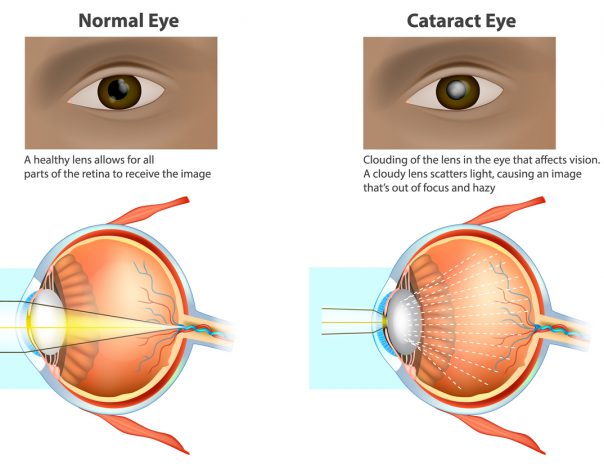Is Cataract Surgery Necessary?
Cataracts can cause blurred vision and badly impaired sight. No medication or non-invasive procedure is available to successfully treat cataracts – no matter what wild claims you may read online! To date, surgery is the only known way to remove cataracts and restore clear, sharp vision.
When the lens within the eye structure thickens, it is termed “a cataract.” When the condition is in the early stages, it may not be troublesome or even noticed. As it progresses, it worsens, and at that point, surgery should be performed. If left to progress, the thickness of the lens can lead to inflammation or even blindness.
What are the benefits of cataract surgery?
Clear, sharp vision: the number one benefit of cataract surgery is clearer vision. Within several days of the surgery, your vision clears. Colors will look brighter, and objects will begin to look crisp.
Increased quality of life: Cataracts can prevent you from enjoying everyday activities that many take for granted, such as reading or driving. The ability to drive, read, enjoy movies, TV, and see your family and friends clearly will greatly increase your quality of life.
Decreased risk of injury: aging brings with it the increased likelihood of injury from falls. The older we get, the more likely a fall could cause serious injuries. Vision loss increases the chances of being injured in a serious fall. Undergoing cataract surgery can markedly decrease the risk of sustaining a hip fracture – one of the most common injuries affecting older people. Why not have clear vision so you can avoid that curb, rug, or pothole?
Longer life: In a study carried out by the American Academy of Ophthalmology, cataract surgery was associated with increased survival of older individuals, and there was a startling 40 percent reduction in mortality for those that had had cataract surgery over those who had not.
How quickly do cataracts progress?
Your ophthalmologist will determine whether or not you have cataracts that are fast-developing. Your eye health and condition of the lens are diagnosed with specific tests and eye exams. The following tests will help your ophthalmologist to understand the rate of progression of your cataracts:
- Visual acuity: this is the test most think of when visiting the eye doctor. It consists of eye charts with a series of different letters on them. The difference in your eye chart results can indicate whether your cataracts are developing quickly or slowly.
- Dilated eye exam: your doctor will use drops that dilate the pupil. He or she will then look into the eye and examine it for any telltale cataract signs such as yellowing, spots, and streak.
- Tonometry: your doctor will use an instrument to measure the internal pressure of the eye. Internal pressure is important because it can tell your doctor whether or not your vision changes are due to a condition other than cataracts.
What causes cataracts?
Cataracts are caused by changes in the protein which make up the lens of the eye. This change can occur due to various factors, including:
- Aging
- Genetic disorders
- Past eye surgery
- Diabetes
The change in the protein makeup of the lens causes it to become cloudy, stopping light from easily passing through. As the lens thickens, it results in loss of vision, interfering with your overall quality of life.
What are the symptoms of cataracts?
Symptoms of developing cataracts include:
- Blurry vision
- Cloudy vision
- Light sensitivity
- Halos
- Worsening night vision
- Glare
- Dull colors
Lotus Vision serving Atlanta and Alpharetta, Georgia
Don’t take risks when it comes to eye health and vision. When you need eye surgery, entrust your vision to the best of the best. Lotus Vision has a reputation in Atlanta and Alpharetta as the elite state-of-the-art vision and eye care center. We perform the latest advancements in laser cataract surgery in Atlanta and Alpharetta, GA have to offer. Our board-certified ophthalmologist and eye doctor in Atlanta, Dr. Nemi, is unmatched in skill.





